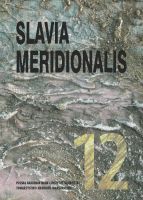Европа на сцената на современата македонска драма
Europe on the contemporary Macedonian dramatic stage
Author(s): Nataša AvramovskaSubject(s): Literary Texts
Published by: Instytut Slawistyki Polskiej Akademii Nauk
Keywords: Macedonian drama; Goran Stefanovski; East–West
Summary/Abstract: As part of the topic I decided to speak about the dramatic opus of Goran Stefanovski, mostly for three chief reasons which are elaborated in the paper: 1. The thematic constant of his dramatic worldview is to represent Macedonia (namely, the Balkans and its Slavic population) against the ‘big, white western world’ of Europe and the US. This East-West imagological conditionality and juxtaposition of meanings inside Stefanovski’s dramatic worlds provides the basis for the dramatic conflicts in his plays, including those written during the socialist period of his upbringing (Wild Flesh, Tattooed Souls), when Stefanovski resides in Skopje (Macedonia), and writes in Macedonian, and those written after the break-up of the SFRY (Casabalkan, Euroalien, Hotel Europa), when Stefanovski lives and works in Canterbury (England), and writes in English. 2. The imagological thematic constant which runs through the European East vs. West in Stefanovski’s opus is something his writing shares with the thematic preoccupations of other contemporary Macedonian dramatists (such as Jordan Plevnesh, Venko Andonovski, Dejan Dukovski). With that, the plays of Andonovski and Dukovski evidently reference scenes from Stefanovski’s works. Along those lines, it’s safe to say that Stefanovski is the paradigmatic (emblematic) Macedonian playwrighter. 3. The play-script for Stefanovski’s theatre productions written during the past decade and a half, as integral parts of international theatre projects and productions, have received a wider international acclaim and visibility by the European theatre audiences. His dramatic works allow for the voice(s) of the other, the silenced Europe, to resonate at the center of the European cultural capitals. With that, the interculturality of these theatre projects (performed at all levels of the production), allows for the articulation of the mutual demonization that generates the imagological, ideological and geopolitical difference which exists between Europe and the Balkans.
Journal: Slavia Meridionalis
- Issue Year: 2012
- Issue No: 12
- Page Range: 13-27
- Page Count: 15
- Language: Macedonian

